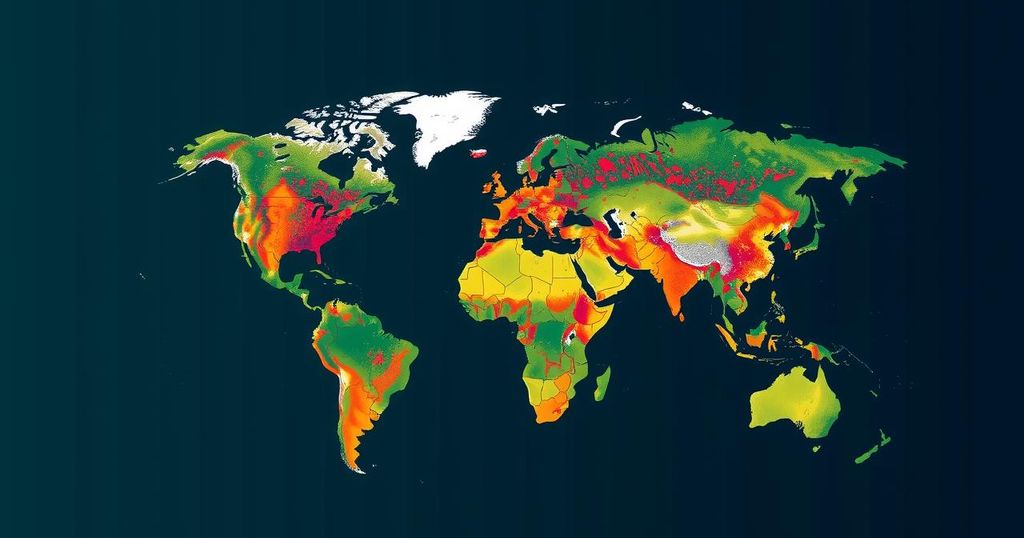Climate change
ARGENTINA, ASIA, CAN INTERNATIONAL, CHINA, CLIMATE CHANGE, DENMARK, ENERGY, ENVIRONMENTAL POLICY, EUROPE, EUROPE/ASIA, EUROPEAN UNION, GERMANWATCH, GLOBAL WARMING, GREENHOUSE GAS EMISSIONS, IRAN, MEXICO, NETHERLANDS, NEWCLIMATE INSTITUTE, NORTH AMERICA, PARIS AGREEMENT, RUSSIA, SAUDI ARABIA, SOUTH AMERICA, UNITED ARAB EMIRATES, UNITED KINGDOM
Marcus Li
0 Comments
CCPI 2025: Renewables Surge Amidst Fossil Fuel Dependence
The CCPI 2025 reveals rapid growth in renewable energy among the world’s largest emitters, yet many countries remain reliant on fossil fuels. Notable rankings include Denmark (4th), the Netherlands (5th), and the UK (6th), while major oil producers like Iran and Saudi Arabia rank low. The report emphasizes urgent climate action to meet Paris Agreement targets amid a mixed picture of progress.
The Climate Change Performance Index (CCPI) for 2025, developed by Germanwatch, NewClimate Institute, and CAN International, assesses the efforts of major emitting countries in addressing climate change. With 64 nations, including the European Union, accounting for 90% of global emissions, the report highlights encouraging advancements in renewable energy while simultaneously acknowledging a persistent reliance on fossil fuels, particularly fossil gas. Remarkably, 61 of the 64 assessed countries have increased their renewable energy contributions, yet emission trends in 29 countries remain critically low or very low, demonstrating a pressing need for intensified climate action to meet Paris Agreement targets. Among the report’s findings for top performers, Denmark ranks fourth, showcasing exemplary climate policy engagement even though it falls short of an overall very high rating. Following closely are the Netherlands in fifth, despite potential policy setbacks under its new government, and the United Kingdom, which significantly advanced to sixth place thanks to its coal phase-out and commitment against new fossil fuel licenses. In contrast, Argentina has suffered in ranking to 59th due to negative governmental shifts affecting climate policy. The bottom tier of CCPI rankings features major oil and gas producers such as Iran, Saudi Arabia, the United Arab Emirates, and Russia, all exhibiting renewables accounting for less than 3% of their energy mix. China, although the largest emitter falling to 55th, is witnessing a remarkable increase in renewables, prompting hopes for emission stabilization. The United States lingers in 57th place with urgent needs for enhanced renewable investments and phasing out fossil fuel subsidies. While the United Kingdom and India are notable high performers among G20 nations, the majority of G20 members, accounting for over 75% of global emissions, have exhibited dismal performance. The European Union collectively ranks 17th, with a noticeable absence of very low-performing countries, highlighting the positive impact of its Green Deal. Sixteen EU nations are classified as high or medium performers. Overall, this year’s CCPI illustrates the critical balance between renewal energy growth and a transition away from fossil fuels, emphasizing the need for accelerated global climate response.
The Climate Change Performance Index (CCPI) is an annual assessment that evaluates the effectiveness of climate policies and action efforts among the world’s largest greenhouse gas emitters. This index is crucial as it provides insight into the progress made toward reducing global emissions and adopting renewable energy sources, which are vital in combating climate change. By analyzing the performance of these nations, stakeholders can identify areas of improvement and mobilize international efforts to transition from fossil fuels to sustainable energy solutions, thereby addressing the pressing global climate crisis.
In summary, the CCPI 2025 indicates significant advancements in renewable energy use among the largest emitting countries, though many still heavily depend on fossil fuels. Notably, Denmark, the Netherlands, and the UK emerge as leaders, whereas large producers like Iran and Saudi Arabia linger at the bottom. Amidst these developments, the necessity for intensified climate action is paramount to align with the Paris Agreement objectives, underscoring the urgent nature of the global response to climate change.
Original Source: newclimate.org




Post Comment